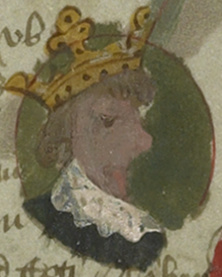Kamber on:
[Wikipedia]
[Google]
[Amazon]
 Camber, also Kamber, was the legendary first king of
Camber, also Kamber, was the legendary first king of
 Camber, also Kamber, was the legendary first king of
Camber, also Kamber, was the legendary first king of Cambria
Cambria is a name for Wales, being the Latinised form of the Welsh name for the country, . The term was not in use during the Roman period (when Wales had not come into existence as a distinct entity). It emerged later, in the medieval period, ...
, according to the Geoffrey of Monmouth
Geoffrey of Monmouth ( la, Galfridus Monemutensis, Galfridus Arturus, cy, Gruffudd ap Arthur, Sieffre o Fynwy; 1095 – 1155) was a British cleric from Monmouth, Wales and one of the major figures in the development of British historiography ...
in the first part of his influential 12th-century pseudohistory ''Historia Regum Britanniae
''Historia regum Britanniae'' (''The History of the Kings of Britain''), originally called ''De gestis Britonum'' (''On the Deeds of the Britons''), is a pseudohistorical account of British history, written around 1136 by Geoffrey of Monmouth. I ...
''. According to Geoffrey, Cambria, the classical name for Wales
Wales ( cy, Cymru ) is a country that is part of the United Kingdom. It is bordered by England to the east, the Irish Sea to the north and west, the Celtic Sea to the south west and the Bristol Channel to the south. It had a population in ...
, was named for him.
Camber was the second son of Brutus
Marcus Junius Brutus (; ; 85 BC – 23 October 42 BC), often referred to simply as Brutus, was a Roman politician, orator, and the most famous of the assassins of Julius Caesar. After being adopted by a relative, he used the name Quintus Serv ...
and Innogen
Innogen is a character in the ''Historia Regum Britanniae'' and subsequent medieval British pseudo-history. She was said to have been a Greek princess, the daughter of King Pandrasus, and to have become Britain's first Queen consort as the wife ...
, and a descendant of Aeneas
In Greco-Roman mythology, Aeneas (, ; from ) was a Trojan hero, the son of the Trojan prince Anchises and the Greek goddess Aphrodite (equivalent to the Roman Venus). His father was a first cousin of King Priam of Troy (both being grandsons ...
of Troy
Troy ( el, Τροία and Latin: Troia, Hittite: 𒋫𒊒𒄿𒊭 ''Truwiša'') or Ilion ( el, Ίλιον and Latin: Ilium, Hittite: 𒃾𒇻𒊭 ''Wiluša'') was an ancient city located at Hisarlik in present-day Turkey, south-west of Ç ...
. Upon his father's death he was given Cambria, while his younger brother Albanactus
Albanactus, according to Geoffrey of Monmouth, was the founding king of Albania or Albany. He is in effect Geoffrey's eponym for Scotland. His territory was that north of the River Humber. This myth was then taken up by Giraldus Cambrensis.
Leg ...
got Alba
''Alba'' ( , ) is the Scottish Gaelic name for Scotland. It is also, in English language historiography, used to refer to the polity of Picts and Scots united in the ninth century as the Kingdom of Alba, until it developed into the Kingdom ...
(the territory corresponding to modern Scotland
Scotland (, ) is a Countries of the United Kingdom, country that is part of the United Kingdom. Covering the northern third of the island of Great Britain, mainland Scotland has a Anglo-Scottish border, border with England to the southeast ...
; from Welsh ''Yr Alban'') and his older brother Locrinus
Locrinus was a legendary king of the Britons, as recounted by the 12th-century chronicler Geoffrey of Monmouth in his ''Historia Regum Britanniae''.
According to Geoffrey, Locrinus was the oldest son of Brutus and Innogen, and a descendant of ...
received Logres
Logres (among various other forms and spellings) is King Arthur's realm in the Matter of Britain. It derives from the medieval Welsh word '' Lloegyr'', a name of uncertain origin referring to South and Eastern England (''Lloegr'' in modern Welsh ...
(corresponding to England except for Cornwall; from Welsh ''Lloegr'') and the title of List of legendary kings of Britain, King of the Britons. When Albanactus was murdered by Humber the Hun, Humber, King of the Huns, Camber joined Locrinus in attacking and defeating him.
Like many of the characters reported by Geoffrey, Camber has no historical basis but is the product of Geoffrey of Monmouth's imagination, invented largely for political ends within the contemporary Anglo-Normans, Anglo-Norman world.See for instance J. S. P. Tatlock's classic study, ''The Legendary History of Britain'' (Berkeley and Los Angeles, 1950).
The ''Book of Baglan'' provides a list of descendants of Camber, starting with his eldest son Gorbonian, who became List of legendary rulers of Cornwall, duke of Cornwall and chief governor of Cambria, and his second son Albon, governor of North Cambria and earl of Ewias and Urtchingfild. Through Gorbonion, Dyfnwal Moelmud was descended, who became king of Britain, and eventually the line passes to Henry VII of England, Henry VII. It also gives attributed arms to Camber, "2 lions rampant, vert."
References
{{Geoffrey of Monmouth Legendary British kings Welsh mythology